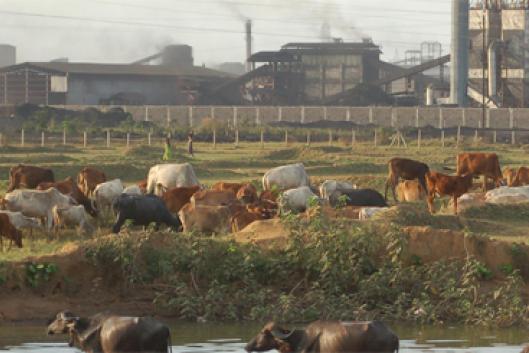Another standard has been launched into a dead market that from the start was a false solution. Mainly polluting industries and consultancies benefitted from this carbon market and its existence promoted the illusion that climate change could be halted by offsetting, or moving emissions around instead of reducing them. On 24 April 2013, the Women Organizing for Change in Agriculture & Natural Resource Management (WOCAN) launched the Women’s Carbon Standard. Supported to the tune of “a few million dollars” by the Asian Development Bank (ADB), WOCAN director Jeannette Gurung describes the standard as “a unique certification label that creates a standard for endorsing carbon offset or renewable energy projects that promote women’s empowerment and sustainable development”. How much of the “few million dollars” has reached women’s groups and how much has flown into the bank accounts of consultants is unclear from the information available on the standard. According to the information available, the standard would certify the benefits of increasing women’s participation in carbon offset and renewable energy project development and endorse projects that create increased direct or indirect economic benefits for women.
The question arises, however, how such a standard could ever do more than ‘genderwash’ a mechanism that by design undermines women’s rights, increases exposure of women to the impacts of climate change and exacerbates injustice by allowing those who have historically emitted most greenhouse gases, and thus bear the main responsibility for climate change, to emit even more? Where is the empowerment for women living in rural communities in the global South who are asked to reduce their meagre emissions from burning firewood for cooking so affluent and wasteful buyers in the corporate and voluntary carbon markets can with clear conscience continue to belch out luxury emissions?
Underlying causes of the disempowerment of rural women who remain trapped in structural poverty remain unquestioned, the link between the carbon market and the development that passes them by but for which they pay the price of impoverished livelihoods, remains unaddressed by the standard. The women’s carbon standard will also do nothing to address the harmful impacts of the large majority of carbon offset projects on women’s lives, because the standard will be applicable only to “projects suitable for the mechanism” - which means the few boutique projects that for example sell cooking stoves to impoverished households or support installation of biogas digesters. Whether a voluntary certification standard can not only remedy the problems that have arisen even with these supposedly benign projects (see Mausam 2010 publication with case studies from India), but in addition turn such projects into ‘empowerment for women’ is highly questionable. And even if it did provide some additional revenue for a select number of women with access to the project – at what cost does that revenue come?
A statement launched in response to the women’s carbon standard states: “We […] reject the Women’s Carbon Standard, “gender sensitive carbon offset projects,” “women and children methodologies” and the promotion and certification of carbon trading and carbon offset projects of any kind, as women’s empowerment and leadership or our families’ and children’s wellbeing. Carbon trading violates our right to life by selling permits to pollute to polluters and makes climate change worse. Carbon offsets projects have resulted in land grabs, human rights abuses, violation of the rights of women, children and Indigenous Peoples, forced displacement, armed guards, jailing, persecution and criminalization of activists. We defend life and human rights and demand climate justice now!”
In 2011, the GenderCC-Women for Climate Justice, a global network of women, gender activists and experts from all world regions working for gender and climate justice, issued a statement in response to UN efforts to include forests into carbon markets through REDD. On the issue of gender and carbon markets, Gender CC state that: “However important to integrate gender in the carbon markets and REDD Plus, the latter are still false solutions which can lead to a poisonous scramble for resources and engender danger, displacement and disempowerment.” Whether meaningful gender mainstreaming and women’s empowerment can be achieved in the context of a mechanism that by design increases risk of run-away climate change, with impacts that will affect women particularly hard, is a question we need to ask ourselves.
The statement “Carbon Trading, CDM and REDD: New Forms of Violence against Women NOT Women’s Empowerment!”, organised by No REDD+ / Global Alliance of Indigenous Peoples and Local Communities on Climate Change against REDD and for Life, is available athttp://wrm.org.uy/subjects/REDD/noredd-english.pdf for sign-on.
Article based on: WOCAN Women’s Carbon Standard: Leveraging Carbon Finance for Women’s Empowerment, http://wocan.org/sites/drupal.wocan.org/files/WOCAN%20Women's%20Carbon%20-1.pdf, and http://www.womenscarbon.org/sites/default/files/womens-carbon-standard.pdf ; “Still A Frozen Pie: GenderCC - Women for Climate Justice on the Bangkok Intersessional Meeting 2011,” GenderCC press statement, April 7, 2011, http://www.gendercc.net/network/gendercc-news/news-details/browse/1/article/still-a-frozen-pie-gendercc-on-the-bangkok-intersessional
-meeting-2011/169.html?no_cache=1
